Technology Reporter
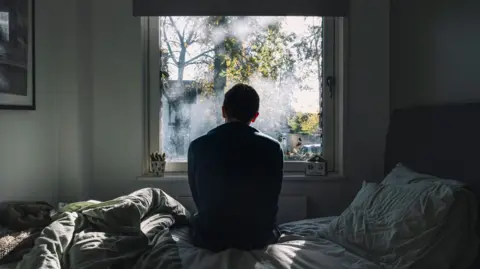 Getty Images
Getty ImagesInstagram users have told the BBC of their confusion, fear and anger after having their accounts suspended, often for being wrongly accused by parent company Meta of breaching the platform’s child sex abuse rules.
For months, tens of thousands of people around the world have been complaining Meta has been banning their Instagram and Facebook accounts in error.
They say they have been wrongly accused of breaching site rules – including around child sexual exploitation.
More than 500 of them have contacted the BBC to say they have lost cherished photos and seen businesses upended – but some also speak of the profound personal toll it has taken on them, including concerns that the police could become involved.
Meta acknowledged a problem with the erroneous banning of Facebook Groups in June, but has denied there is wider issue on Facebook or Instagram at all.
It has repeatedly refused to comment on the problems its users are facing – though it has frequently overturned bans when the BBC has raised individual cases with it.
Here are some of the stories users have shared with BBC News.
‘I put all of my trust in social media’
Yassmine Boussihmed, 26, from the Netherlands, spent five years building an Instagram profile for her boutique dress shop in Eindhoven.
In April, she was banned over account integrity. Over 5,000 followers, gone in an instant. She lost clients, and was devastated.
“I put all of my trust in social media, and social media helped me grow, but it has let me down,” she told the BBC.
This week, after the BBC sent questions about her case to Meta’s press office, her Instagram accounts were reinstated.
“I am so thankful,” she said in a tearful voice note.
Five minutes later, her personal Instagram was suspended again – but the account for the dress shop remained.
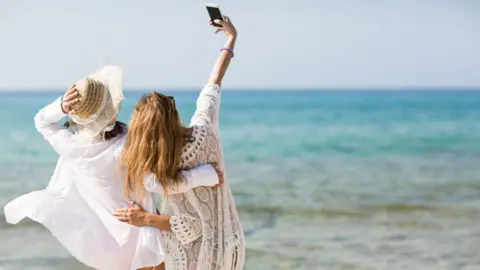 Getty Images
Getty ImagesLucia, not her real name, is a 21-year-old woman from Austin, Texas.
She was suspended from Instagram for just over two weeks for breaching Meta’s policy on child sexual exploitation (CSE), abuse and nudity.
As with all the other cases, she was not told what post breached the platform’s rules.
That has left wondering if a picture she posted of herself and her 21-year-old friend wearing bikini tops somehow triggered the artificial intelligence (AI) moderation tools, as she thinks they “look a little bit younger”.
She also uses her account to interact with under 18s, such as sending Reels to her younger sister.
“It is deeply troubling to have an accusation as disgusting as this one,” she told BBC News.
“Given that I have a desire to work in juvenile justice as an attorney and advocate on behalf of children, I am appalled to have been suspended for something I know I did not do and would never do.”
She appealed, and then about seven hours after the BBC highlighted Lucia’s case to Meta’s press office, her account was restored with no explanation.
Over 36,000 people have signed a petition accusing Meta of falsely banning accounts; thousands more are in Reddit forums or on social media posting about it.
Their central accusation – Meta’s AI is unfairly banning people, with the tech also being used to deal with the appeals. The only way to speak to a human is to pay for Meta Verified, and even then many are frustrated.
Meta has not commented on these claims. Instagram states AI is central to its “content review process” and Meta has outlined how technology and humans enforce its policies.
A community torn away
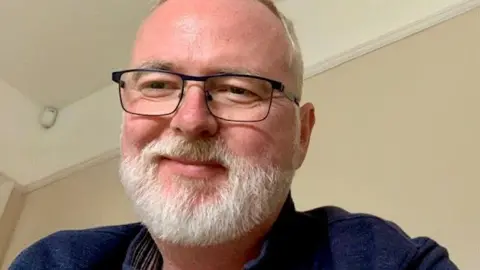 Duncan Edmonstone
Duncan EdmonstoneDuncan Edmonstone, from Cheshire, has stage four ALK+ lung cancer. The 55-year-old finds solace in the support network he has on private Facebook groups.
For 12 days at the end of June, he was banned for breaking cybersecurity guidelines before being reinstated.
“The support groups are my lifeline, and there are actual examples of where advice from group members has made a difference to other patient’s treatment,” he said.
“I draw satisfaction and meaning, in a life that is probably going to be cut short, from helping other people in that group.”
Banned, unbanned – then banned again
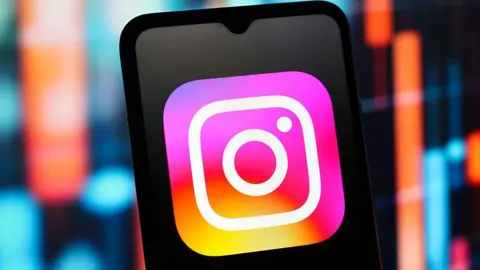 Getty Images
Getty ImagesRyan – not his real name – has been banned, reinstated, and banned again from Instagram over the past few months.
The former teacher from London was thrown off the platform in May after he was accused of breaching the CSE policy.
He spent a month appealing. In June, the BBC understands a human moderator double checked and concluded Ryan had breached the policy.
Then his account was abruptly restored at the end of July.
“We’re sorry we’ve got this wrong,” Instagram said in an email to him, adding that he had done nothing wrong.
Ryan was left flabbergasted.
“‘Sorry we called you a paedophile for two months – here is your account back,'” is how he characterised the tone of the message.
But that wasn’t the end of the story.
Hours after the BBC contacted Meta’s press office to ask questions about his experience, he was banned again on Instagram and, for the first time, Facebook.
“I am devastated and I don’t know what to do,” he told the BBC.
“I can’t believe it has happened twice.”
His Facebook account was back two days later – but he was still blocked from Instagram.
Ryan says he has been left feeling deeply isolated – and worried the police are going to “knock on the door”.
His experiences mirrors those of other Instagram users who told the BBC of the “extreme stress” of having their accounts banned after being wrongly accused of breaching the platform’s rules on CSE.
What has Meta said?
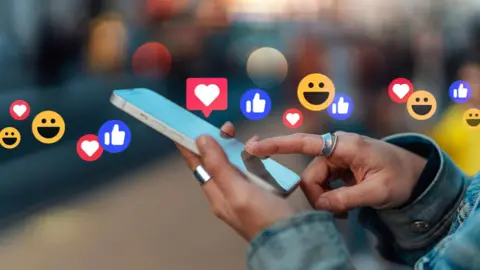 Getty Images
Getty ImagesDespite taking action on Yassmine, Lucia and Ryan’s accounts, Meta has not made any comment to the BBC.
In common with all big technology firms, it has come under pressure from authorities to make its platforms safer.
In July, Meta said it was taking “aggressive action” on accounts breaking its rules – including the removal of 635,000 Instagram and Facebook accounts over sexualised comments and imagery in relation to children.
Meta’s wide-ranging policy on child sexual exploitation has changed three times since Boxing Day last year, with all amendments occurring since 17 July.
It has not said what impact, if any, these changes had on the cases the BBC has raised with it.


